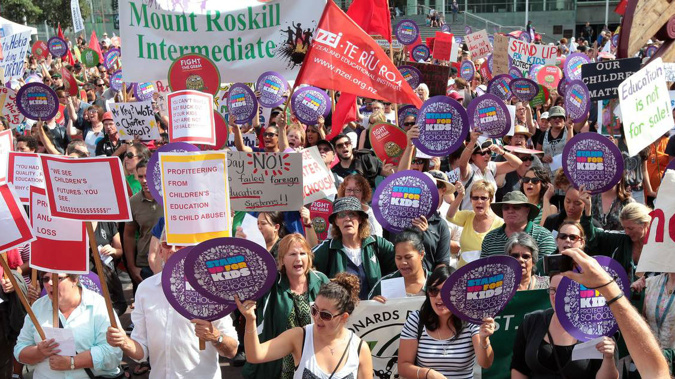
Primary and secondary teachers have voted for a historic first combined all-schools strike on May 29.
The strike, on the eve of the Government's much-vaunted May 30 "Wellbeing Budget", will aim to persuade ministers to spend more on boosting teachers' pay and conditions than the $1.2 billion over four years that they have already offered.
But the Ministry of Education will seek an immediate return to facilitated bargaining to try to stave off the strike.
Both primary and secondary teachers have been offered pay rises of 3 per cent a year for three years plus an extra top grade that would give many teachers effective pay rises of 12 per cent over three years.
But the primary teachers' NZ Educational Institute (NZEI) and the Post-Primary Teachers' Association (PPTA) are holding out for more action on more staffing and more classroom release time to reduce heavy workloads.
Primary teachers have already gone on strike twice in this bargaining round - in August and November.
The secondary teachers' collective agreement expired later, and the two unions have been planning for months to wait until they could both strike together to put maximum pressure on the Government, via parents who may have to take time off work to look after their children.
A poll of 1000 New Zealanders released by the unions this month found that 83 per cent of the public agree that "teachers need a pay rise", 79 per cent agree that "teachers need more time for planning, preparation and assessment", 76 per cent agree that primary school classes should be reduced and 73 per cent agree that secondary class sizes should be reduced.
However Education Minister Chris Hipkins has said repeatedly since November that the Government would not offer more than the $1.2 billion it has offered so far, and was only willing to talk about how that sum could be spent.
Ministry of Education head Iona Holsted said the ministry would apply to the Employment Relations Authority for an urgent return to facilitated bargaining with NZEI and would seek to start this process for secondary teachers.
"We have invited both NZEI Te Riu Roa and NZPPTA to join in these applications," she said.
"We are seeking facilitated bargaining, because it is the strongest form of assistance available to the parties involved to reach a negotiated settlement.
"Throughout our ongoing pay discussions we have been willing to discuss options for the combined $1.2 billion settlement. We have also invited both unions to talk about how we can address their time and other concerns outside of the pay talks."
The teachers' strike will come five days after a second national student strike for more action on climate change, scheduled for May 24.
Take your Radio, Podcasts and Music with you









